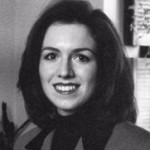BIO Conference Preview: A Conversation between Kitty Kelley and Barbara Burkhardt
Bestselling biographer Kitty Kelley—a founding BIO member who serves on the board— will appear with biographers James McGrath Morris and Linda Lear at the conference in Washington, DC. Their panel, moderated by Abigail Santamaria, will address the question, Does gender matter in biography? Kitty talks to BIO Secretary and site co-chair Barbara Burkhardt about biography and gender—and her dedication to BIO.

Kitty Kelley

Barbara Burkhardt
Barbara Burkhardt: What generated the idea for the panel “Does Gender Matter”?
Kitty Kelley: Linda Lear was talking to me about how she decided not to do a biography of Harold Ickes, Sr. She said that, as a woman, she just didn’t feel she could empathize with this male subject. And, on the other hand, Jamie Morris said that he leaped to do his biography of Ethel Payne. It really is interesting that empathy is the deciding factor.
BB: What is your own take on how gender affects writing biography?
KK: A Harvard study showed that gender does make a difference. In relation to writing a life story, the study showed that women are better at getting to the hows and the whys of a life. Women are more concerned with relationships. They pay more attention to relationships.
I can’t say that women are better biographers than men. I don’t mean that at all. It’s just that male brains work differently than female brains. Men go from A to B, women go from A to R—and then back to F. As a result, women might be better at getting certain kinds of information. Men love data. Only 10 percent of the men who read, read fiction. They read history, politics, current affairs, business, and sports. Women read fiction.
And in biography, you have to give more than info and data and facts—you have to provide a human dimension: Why did they do it? How did they do it? You have to get people talking about their feelings and fears. The study showed that it is easier for women to handle ambiguity than it is for men. In essence, men want to solve the problem. Women want to understand the problem. They have been trained to take care. Men seem to take charge.
Many of our well-known male biographers have written about male subjects: David Marannis on Clinton, Walter Isaacson on Steve Jobs, Taylor Branch on Martin Luther King. I think the hard part would be to find male biographers who have written about women. But I don’t know. Christopher Ogden wrote about Pamela Harriman.
BB: You have published best-selling biographies of both men and women in your career—Sinatra, Nancy Reagan, and Oprah, to name a few. Do you approach writing about women and men differently? How was your experience as a biographer different when you wrote about women than when you wrote about men?
KK: I don’t find a difference, but then I am not representative. I am writing without my subject’s approval and editorial control. I don’t know any other woman who has written about Frank Sinatra. There have been men who have written about Nancy Reagan. So it is hard to say.
My first biography was on Jacqueline Kennedy Onassis. Others said I should follow that with a biography of another strong woman, and it turned out to be my least favorite biography—on Elizabeth Taylor. She is definitely a worthy subject: the last star of the studio system that doesn’t exist anymore, a system responsible for many of our cultural icons and the prevailing views of the times. Yet, once I looked into it, I found her life to be almost boring. Husbands, hospitals, and jewelry stores. It really almost turned me off of writing biography. Finally my agent asked me, “If you were going to do another biography, who would you do?” And I said Frank Sinatra. That’s how that book came about.
When I wrote Jackie Oh!, it was as much about Kennedy men as an iconic woman. And of course, Nancy Reagan was about Nancy Reagan. The Family¸ about the Bush family, was all about men and the book about the British royal family involved both men and women. The last biography I did was Oprah.
BB: Your fellow panelist James McGrath Morris recently published the biography of Ethel Payne, a pioneering African American female journalist. And Linda Lear, also on the panel, has published biographies of women. What issues do you think might come up for discussion related to the biographical subjects the three of you have chosen through your careers?
KK: I am fascinated by both panelists, who are also personal friends. I am not unbiased here. I have great affection for both.
Jamie has a fascinating take being a white male writing about a black female, which is why he will be so valuable to the discussion. Linda is more of an academic, and has written about Rachel Carson and Beatrix Potter. I also find it interesting why she has chosen to write about women and passed on the chance to write about a man.
I am so interested in Jamie’s book because recently I have written two books dealing primarily with African Americans. One was the biography of Oprah. It was a white woman writing about a black woman, and Oprah’s reaction to the book, which was not welcoming and affectionate, probably harmed it. On the other hand, writing a photo book on the March on Washington, I don’t know whether it [being a white woman] helped or hurt. That Kitty had not done an unauthorized bio is probably what held that back. So I identified with Jamie because he has written a book about a black woman active in the Civil Rights era. And I’ve worked with both of these subjects.
And with Linda I’ve identified as another woman writing a traditional treatment of historical figures. Jamie is quite funny when he tells his stories of writing about a woman. Linda and I could easily talk about weight, clothing, and wigs. Jamie had to educate himself.
BB: From your perspective, what can a biographer gain from being involved in BIO?
KK: There is everything to be gained and nothing to be lost. The times spent in BIO networking with your own will help you in telling a life story because there are people like Linda Lear, and Jamie, and Brian Jay Jones who can help. You can reach out to them. How do I go about finding this? How do I deal with the estate? With recalcitrant subjects? What if my subject is alive? If you have questions, you can reach out to this group.
It is so hard today to get a contract with a mainstream publisher, and BIO has helped many writers with the agent speed-dating, coaching, and other programs. The reason BIO is so crucial to a biographer is that there are many questions biographers have that can only be answered by biographers who have been through it.
BB: You have been active on BIO’s board for a number of years and, for the second time, you are hosting a reception at your DC home on Friday night, June 5, as a fundraiser for BIO. Can you talk about why you are dedicated to the organization?
KK: I’m absolutely dedicated. BIO is so fabulous because it is for those of us who tell life stories. It brings people together who share dilemmas. And it’s important to have a support system like that because we all spend so much time alone. I believe in BIO and would like to do whatever I can to help the organization not only survive, but thrive. Hoisting a glass is the least I can do.